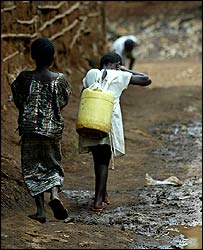US President George W Bush and Prime Minister Tony Blair say they are close to an agreement on providing debt relief for Africa's poorest countries.
They propose to write off the debt of 32 countries, provided they tackle corruption and enact economic reforms.
The pair will seek backing for their plan from the world's richest nations at the G8 group's summit next month.
The US has also promised $674m (£350m) in aid for Africa - far less than Mr Blair had hoped to secure.
 |
 To lower the ambition at this critical stage would be seen by many as a betrayal of Africa
To lower the ambition at this critical stage would be seen by many as a betrayal of Africa

|
The BBC's Andrew Marr says the British leader hopes Mr Bush will ultimately offer a lot more in direct aid.
Mr Bush made his aid pledge at a joint news conference given by the two leaders on Tuesday. Aid groups said the sum was a "drop in the ocean".
The prime minister had earlier said he planned to convince rich countries to add to their existing contributions - and help raise an extra $25bn (£13.5bn) in African aid.
The two leaders also failed to agree on taking action against climate change - an issue Mr Blair is hoping to highlight at the G8 summit.
 |
 Nobody wants to give money to a country that is corrupt, where leaders take money and put it in their pocket
Nobody wants to give money to a country that is corrupt, where leaders take money and put it in their pocket

|
Mr Blair said he and Mr Bush had differences over the issue which they hoped to discuss over the coming weeks.
The US has consistently refused to ratify the Kyoto treaty, which restricts the emissions of gases said to be responsible for global warming.
The US commitment stops short of the agreement Mr Blair is seeking ahead of July's G8 summit in Scotland.
'Duty to act'
The BBC News website's World Affairs correspondent, Paul Reynolds, says Mr Bush made a key shift on debt in promising extra money to pay for the cancellation of debts to international financial institutions.

Mr Blair has called Africa "a scar on the world's conscience"
|
He says previously Mr Bush had said any debts written off had to be deducted from future aid, but after the talks he used a word which aid experts were hoping for - "additional".
"Our countries are developing a proposal for the G8 that will eliminate 100% of that debt, and that, by providing additional resources, will preserve the financial integrity of the World Bank and the African Development Bank," Mr Bush said.
The BBC's economics correspondent, Andrew Walker, says it is also unclear how the aid pledged so far will be funded.
Britain does not want the money to be drawn from sums already earmarked for poverty relief.
However, the US has so far said the World Bank and International Monetary Fund must bear the cost of any additional aid.
On his first trip to Washington since winning a third term in office last month, Mr Blair said thousands of children were dying every day in Africa from preventable diseases.
"It's our duty to act, and we will," he said.
Mr Bush stressed that good governance was important, saying, "Nobody wants to give money to a country that's corrupt, where leaders take money and put it in their pocket."
Mr Blair agreed that Africa's leaders had to show a commitment to democracy and fighting corruption.
"It's not a something for nothing deal," he said.
'Central commitment'
He said the US had already tripled aid to Africa since he came to office.
Africa is "a central commitment of my presidency," Mr Bush said. "We're committed to doing more in the future."
The $674m he announced is part of the US aid budget that had already been announced but had not yet been allocated to any country.
The money will now be spent on humanitarian emergencies in Africa, with $414m going to Ethiopia and Eritrea for immediate help in fighting hunger.
But the US has refused to agree to give 0.7% of its national income - the amount recommended by the United Nations - in international aid.
Washington's position has angered some development experts.
"The US is not pulling its weight right now," said Professor Jeffrey Sachs of Columbia University's Earth Institute.

